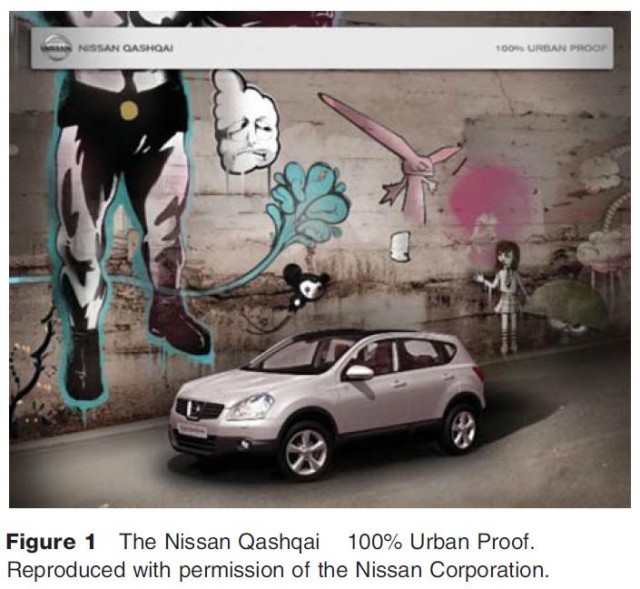Introduction: 100% Urban Proof
In early 2007 Nissan launched a new model of sport utility vehicle (SUV), the Qashqai. The massive in your face marketing campaign described the Qashqai as ''100% Urban Proof '' – posters were designed showing a triumphant tank like vehicle protected from gritty looking streets, with the backdrop of walls plastered in menacing graffiti (Figure 1). The website takes the 'urban proof ' theme even further, showing it roaring around a deserted industrial district accompanied by sinister music, where creepy characters in the graffiti come to life to throw out all kinds of obstacles (oil slicks, road bumps) for the Qashqai to negotiate. It does so with ease, for Qashqai ''claims the urban environment as its own playground,'' and its ''dynamic profile, flared wheel arches and durable black cladding protect it from the trials and tribulations of urban life.'' Furthermore, there is an optional ''electronic stability program,'' which ''enhances this surefootedness by keeping on course when the unexpected happens.''
The Qashqai is a pure exemplar of the discourse of anti-urbanism materialized into a product that attempts to provide safety for consumers perceived as afraid of urban places. The message from Nissan is clear: in the dark and dangerous corners of the urban jungle, you will be fine inside this quasi tank off roader! The sense of being in control is amplified by the section of the website entitled ''My Qashqai,'' where you can even design your 'own' urban background for your vehicle. Urban fears can be eased or erased when you go out and buy a Qashqai – just wait and see!

Anti-urbanism is best defined as a discourse of fear of the city, and something fuelled by the impact of images of urban dystopia we see in a variety of media, cinematic, literary, artistic, photographic – and in the case of the Qashqai, corporate – representations of urban places. It is a discourse that has been around for a long time, in conjunction with the emergence of the industrial city, and often constructed in relation to the 'good city' of the ancient Greeks, and especially the perceived virtues of rural life. Anti-urbanism is particularly advanced in the United States in a variety of guises, from the celebration of rural small town kinship and community to the fact that Los Angeles has been completely destroyed 138 times in various motion pictures from 1909 to 1999! Critical analyses of anti-urbanism are vital if the material consequences of widespread urban fears are to be exposed and challenged. As cultural geographers have argued for a long time now, if we leave powerful representations unquestioned, then supposedly fixed 'evidence' about how a society is organized can very easily become treated as overwhelming evidence of how it 'should', or 'must' be organized.
- Anti-Urbanism
- Critique of Anti-Geopolitics
- Anti-Geopolitics as Perspective
- Anti-Geopolitics as (Radical) Politics
- Origin and Context of the Term Anti-Geopolitics
- Anti-Geopolitics
- Geoarchaeology, Environmental History, and Causality
- Cultural Ecology as a Reunion
- Anthropology and the Berkeley Tradition